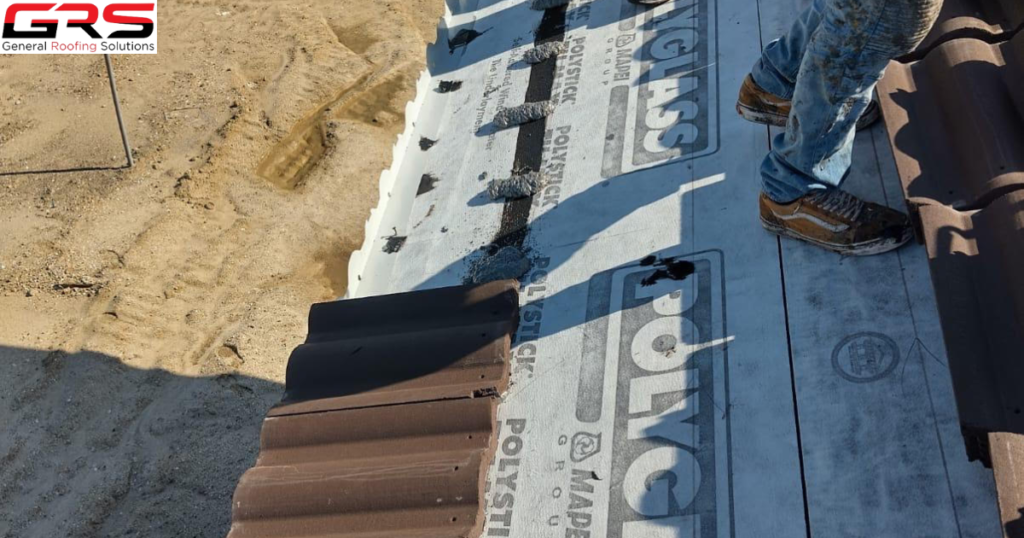When your roof shows signs of wear and tear, one of the first questions you may ask is whether you need a full roof replacement or if a partial roof replacement could be a viable option. Roofs are exposed to various elements over time, including harsh weather conditions, sunlight, and temperature fluctuations, which can lead to damage in specific areas. If only part of your roof is damaged, a roof repair may be sufficient, but sometimes a partial roof replacement is the better choice.

This article will explore when a partial roof replacement makes sense, how it compares to a full roof replacement, and what you should consider when deciding between roof repair and replacing only part of your roof. Whether you’re dealing with damaged shingles, leaks, or structural concerns, this guide will help you determine if a partial roof replacement is the right solution. If you’re unsure whether your roof needs a full replacement or just a partial one, contact us today to schedule a professional roof inspection and receive expert advice.
1. What Is a Partial Roof Replacement?
A partial roof replacement involves replacing only a specific section of the roof rather than the entire structure. This can be a good option when damage is localized to one area due to issues like storm damage, fallen debris, or long-term wear in specific spots. A partial roof replacement is typically more extensive than a roof repair but less costly and time-consuming than replacing the entire roof.
During a partial roof replacement, the damaged portion of the roof is removed, and new roofing materials are installed to match the existing roof. While this process may seem simple, it requires careful planning to ensure that the new section blends seamlessly with the old roof and that the overall structure remains sound.
2. When Is Partial Roof Replacement a Good Option?
There are several scenarios where a partial roof replacement might be a viable option over a complete roof replacement or basic roof repair:
- Localized Damage: If a section of your roof has been damaged by a fallen tree, heavy wind, or a storm, but the rest of the roof is still in good condition, a partial roof replacement can target just the damaged area without the need for a full roof replacement.
- Aging Roof with Isolated Issues: Sometimes, a roof will age unevenly due to factors like poor ventilation, uneven exposure to the sun, or water pooling in specific areas. If only one section shows significant wear while the rest is still functional, a partial roof replacement may address the issue without replacing the entire roof.
- Cost Considerations: Full roof replacement can be a major investment. In cases where most of the roof is still in good condition, a partial roof replacement offers a more affordable solution by focusing on the area in need of attention.
However, it’s essential to weigh the long-term benefits of a partial roof replacement versus a complete roof replacement, especially if your roof is approaching the end of its lifespan. In some cases, it may be more cost-effective to replace the entire roof rather than dealing with multiple roof repair jobs over time.
3. Advantages of Partial Roof Replacement
Opting for a partial roof replacement can offer several advantages, particularly when only a portion of your roof is compromised:
- Cost-Effective: A partial roof replacement is generally more affordable than a full roof replacement. It allows you to address immediate problems without the expense of replacing an entire roof that may still have years of life left.
- Targeted Solution: If damage is limited to a small area, it doesn’t make sense to replace parts of the roof that are still in good condition. A partial roof replacement focuses on the specific area that needs attention, minimizing waste and disruption.
- Preserving Roof Integrity: Sometimes, a roof repair isn’t enough to fix a significant issue, but a full roof replacement seems excessive. A partial roof replacement strikes a balance, preserving much of the original roof while addressing serious problems.
However, there are also potential downsides, such as difficulty in matching new materials to the existing roof and the possibility that underlying problems may not be fully addressed.
If you’re unsure whether a partial roof replacement is the best option for your home, contact us today for a consultation. Our roofing experts will assess your roof and recommend the best approach to meet your needs and budget
4. Disadvantages of Partial Roof Replacement
While a partial roof replacement can be a great solution in some cases, it’s important to consider potential drawbacks:
- Matching Materials: One of the biggest challenges in a partial roof replacement is matching the new roofing materials with the old. Over time, roofing materials weather and change color, making it difficult to find an exact match. This can lead to a patchy appearance, especially if the new section doesn’t blend well with the existing roof.
- Underlying Issues: A partial roof replacement addresses visible damage, but it may not uncover hidden problems that could affect other parts of the roof. If your roof has structural issues or widespread wear, it might be more beneficial to consider a full roof replacement to ensure long-term protection.
- Lifespan Mismatch: A partial roof replacement can create a mismatch in the lifespan of your roof. The new section will likely last longer than the rest of the roof, which means you could face additional repairs or even another partial roof replacement sooner than anticipated.
For homeowners with roofs nearing the end of their life, a full roof replacement might be the smarter long-term investment. A complete replacement ensures that the entire roof is in top condition, reducing the likelihood of future repairs and giving you peace of mind for years to come.
5. Partial Roof Replacement vs. Roof Repair
A key consideration when deciding between partial roof replacement and roof repair is the extent of the damage. Roof repair is typically suitable for minor issues, such as replacing a few missing shingles or sealing a small leak. However, when the damage is more significant or affects the underlying structure of the roof, a partial roof replacement may be necessary.
Here’s how the two options compare:
- Roof Repair: A roof repair is usually a quick fix for small, localized issues. It’s less expensive and can be completed faster, but it may not address deeper problems that could lead to more extensive damage in the future.
- Partial Roof Replacement: When the damage is too severe for a roof repair but doesn’t warrant a full roof replacement, a partial roof replacement offers a middle-ground solution. It’s more comprehensive than a roof repair, addressing both the surface and underlying structure in a specific area, but without the cost of a full replacement.
Ultimately, the decision between a partial roof replacement and a roof repair depends on the condition of your roof and your long-term goals for your home.
6. When to Consider a Full Roof Replacement
While a partial roof replacement can be an effective solution, there are times when a full roof replacement is the better choice. If your roof is older or has extensive damage, replacing the entire roof may be more cost-effective in the long run. A full roof replacement ensures that your roof is structurally sound and up to modern standards, providing peace of mind and long-term protection.
If you’re facing widespread damage, recurring leaks, or an aging roof, contact us for a full roof inspection. We’ll help you decide whether a full roof replacement is the best option for your home.
In Conclusion
A partial roof replacement can be a cost-effective and targeted solution for localized roofing issues. It allows you to address specific damage without the expense of a full roof replacement, but it’s essential to weigh the pros and cons carefully. Whether you’re considering a roof repair, a partial roof replacement, or a full roof replacement, understanding the condition of your roof and consulting with a professional can help you make the right decision for your home.
Contact us today to discuss your roofing options and determine the best solution to keep your home protected for years to come.
Need Roofing Services for your home,Contact us for more details


